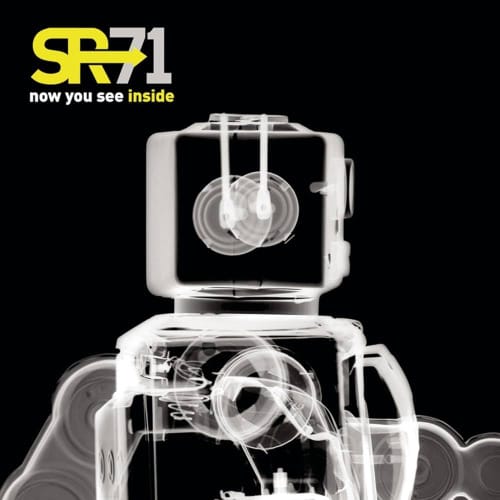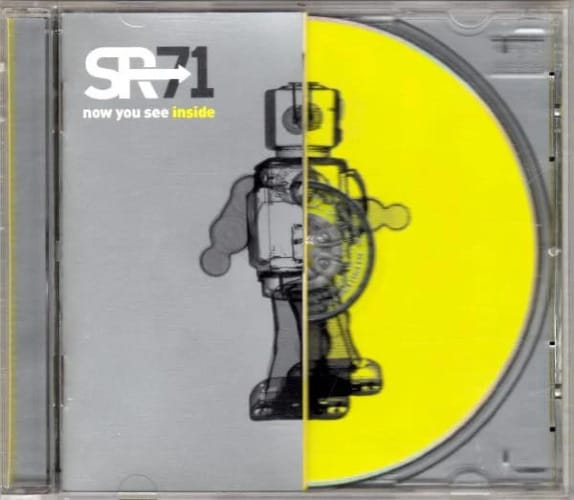Re-Acquiring Old CDs: SR-71's "Now You See Inside"

In a previous blog entry, I described the incredibly unfortunate car accident that caused me to lose all of the CDs I had owned from childhood into young adulthood. If you're interested in reading about that, please take a look at that entry, and then come back to this one. But to summarize, after feeling worried about the state of streaming media and missing my old collection of media that shaped the person I later became, I've recently started re-purchasing as many of those old CDs as I can find, or even remember in the first place. This is yet another entry discussing these albums as I've been getting them back.
SR-71's "Now You See Inside"
I use this version of the album art at the top of this entry first because this is the CD that came to me after I ordered it this year. But actually, I was quite disappointed, because this was not the way the album was originally packaged. This first picture you see here is of a full-sized booklet, but the original album as I had it in the early 2000s actually only included a half-sized booklet, making it stand out against other CD packaging. The art you see below is how it was originally packaged when I first owned it, and I find myself considering looking for a copy that looks like this instead.

This was the first of only three albums this band would ever produce, and I'm not sure that I've ever even heard the other two albums at all. It was released in the year 2000, making me 14 when it dropped. And I remember really liking it at the time, but I have to admit, as I put the disc in the CD player of my car after I bought it again, well, I suddenly realized I hated the lyrics of the first two songs, both of which were the biggest hit singles off the album. I can see how a 14-year-old would have liked the music because it's really cool-sounding music, but I didn't understand what adults were talking about yet.
So the first big hint that I no longer gelled with the sentiment of some of these songs was by simply looking at the title of the very first song on the CD: "Politically Correct". Oh, no.
Oh, that's right. This song was kinda just about thinking, "Whoops, I'm an asshole, and I don't think I can keep myself from being an asshole, so now I'm gonna make it everybody's problem." There are any number of think pieces out there from people much smarter than me about how the term "politically correct" was really just the idea of being "anti-woke", but about 20 years earlier. It's a concept that's always existed but has simply shifted popular nomenclature throughout history. The line that now makes me sort of sit back and cringe today is, "You couldn't make a Mel Brooks movie today. I saw Blazing Saddles yesterday." And, sure, as a 14-year-old I thought, "Yeah, that's true! Nobody would make that movie now!" Well, it's been almost 25 years and people still like to say, "You couldn't make Blazing Saddles today," which is a flawed observation for a number of reasons.
I went back and looked at the music video for this song in preparation to write this blog, and I didn't realize that it was full of weird clips from the 2000 presidential election, with George W. Bush and Al Gore having a bunch of stuff to say about counting votes, watching officials eyeball paper ballots, probably looking for "pregnant" and "dangling chads". And it's just so weird because it doesn't actually have anything to do with the lyrics of the song, aside from the one singular word "politically". But anybody with common sense knows that the term "Politically Correct" doesn't actually have anything to do with, like, political elections.
The weird feelings continue into the second song, "Right Now". On paper, the concept isn't a wholly terrible one. The singer is in a relationship with a woman that clearly isn't right for him, but he's fine with that for the time being. But the way he talks about this woman is just so gross. Like, he clearly hates this lady and has absolutely nothing good to say about her. The only thing he likes about her is having sex with her and he admits that even that isn't making him happy anymore. She's fake, she's clingy, she lies, and he calls her a bitch. But, hey, she's, uh, good enough to maintain a relationship with, I guess? Boy, my standards have really changed over the years. I know at the time I genuinely didn't care what the lyrics were actually saying, but I don't think I can remain that unbiased about lyrics anymore at this stage in my life.
The thing is, though, I actually do like pretty much all of the other songs on the album, so it's kinda weird that two of the three songs that ever got radio airplay were the ones with the shittiest lyrics. The third song, "What A Mess", is actually the song with the line that became the title of the album--"Now you see inside, 'cause I no longer hide." That song, along with most of the rest of the songs on the album, is actually genuinely more thoughtful and sentimental than the first two tracks. There's a lot of self-reflection, and a lot of gentle and thoughtful relationship talk in the rest of the album. So why are the first two songs so mean-spirited?
One of the most poignant tracks on the disc is a song called "Alive", depicting the story of a woman on the night she finally decides to leave her physically abusive relationship with a man. It talks about her getting in the car and driving away off into the night to get away from him, and while she still remembers the man she fell in love with, it doesn't mean the abuses didn't happen, and she finally feels relief and freedom by making her escape. It's understandable why this one wouldn't make it to the radio. I can't think of a lot of radio singles that talk about physically abusive relationships. But that's what makes "Alive" such an interesting song because despite the fact that it's about such a heartbreakingly serious subject matter, there is an uplifting sense of hope because the subject of the song is experiencing true freedom for the first time in forever. It's a topic that's not often depicted in popular music, and I wish these were the kinds of songs that were showcased off the album more.
The last song on the album, "Paul McCartney", is just about as nice as any of the rest of the tracks, though I've long found myself scratching my head and pondering the meaning behind the title. In general, the song is about wanting to take a relationship slowly and enjoy one another's presence for as long as possible, probably in the earliest stages of the relationship where feelings are still fun and growing for each other. But then comes the line, "We'll take our time, tell each other's lies, in a world so much brighter if Paul were still alive." Is this Paul in the song the same Paul as the Paul McCartney in the title? Because, maybe I don't need to say this, but former Beatles member and founding member of Wings' Paul McCartney was not dead when this album was released, and heck, he's still not dead now. Old, yes, but not dead. Hell, he wasn't even all that old when the song first dropped. I went Googling around to see if maybe there was some other hidden meaning to the title of this song. Maybe it's just named "Paul McCartney" because that's a famous Paul, and maybe the Paul in the song isn't actually McCartney at all, but some other Paul that's meaningful to the band but they knew that nobody would know who their Paul was. I don't know, that's just me theorizing. Either way, my searches didn't yield any results--no interviews or behind-the-scenes or anything--so I have no idea why the song is titled this or what it means to claim that Paul is dead.
"Now You See Inside" is an album that sounds very Y2K pop-rock alternative. Looking at the pictures of the band members inside the booklet, you see dudes that are way more attractive than their sound might make you think, with hairstyles that make you realize you are now living in a world where none of what they are wearing makes any kind of fashion sense at all whatsoever anymore. The sideburns alone on keyboardist Mark Beauchemin will kind of make you do a double-take, though if you were around for that era you'd realize that at the time that kind of look wasn't totally abnormal. I seem to remember Ajay Popoff, the lead singer of the band Lit, looking quite a lot like this at around this time period, too.
I have no idea what any of these band members are doing now, though I understand that the bassist sadly passed away nearly 20 years ago. I don't know what SR-71's two other albums sound like. Maybe that's something I'll seek out in the future just to fill in some gaps and follow up on music I was listening to in my youth.
It's kind of funny how reflecting on this music has made me hunger to go and pick up any number of the instruments I have in this apartment collecting dust and start practicing with them once again. We'll see if that ever leads anywhere.
I'll keep writing more blog entries on the re-acquisition of these CDs from my past. I've already collected so many, but if you're at all interested in helping me fill out my collection with what's left of what I haven't reacquired yet, you can check out my Amazon wish list for the remaining CDs that I can remember (and happen to have Amazon listings for).
Thanks again, all. Looking forward to writing more soon.

